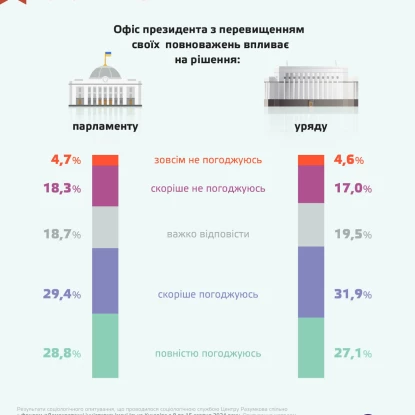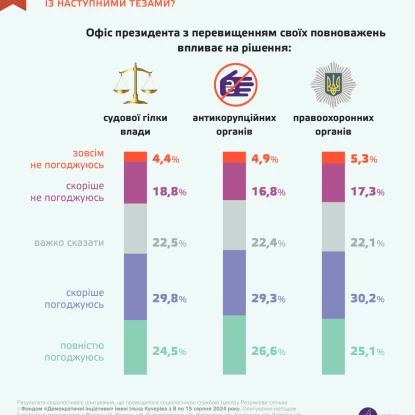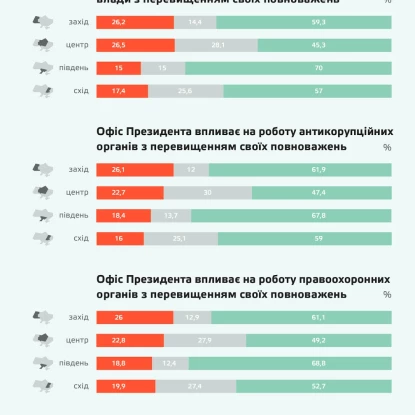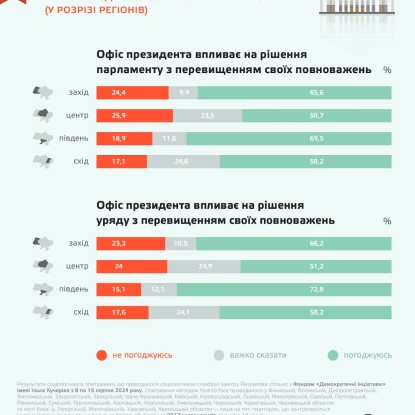Survey: almost 60% of Ukrainians believe that the Office of the President exceeds its powers and influences state bodies
- Mariia Khamitsevych
-
•
-
15:06, 04 September, 2024
Almost 60% of surveyed Ukrainians believe that the Office of the President (OP) exceeds its powers, influencing the parliament, government, courts, law enforcement and anti-corruption bodies.
This is evidenced by the survey conducted by the sociological service of the Razumkov Center together with the Ilko Kucheriv Foundation «Democratic Initiatives» on behalf of the «Chesno» Movement from August 8 to 15, 2024.
It is noted that Ukrainians consider OP's influence on the parliament and the government to be the greatest. The number of those who share this opinion has increased from 52% to 59% compared to last year.
Sociologists note that about 55% of respondents also consider the Office of the President's influence on the work of courts, law enforcement and anti-corruption agencies to be excessive. Last year, 47% of citizens thought so.
According to the survey, more than half of Ukrainians believe that the representatives of the Office of the President exceed their powers, influencing the government and parliament, and therefore the legislation.
The message reminds that the Verkhovna Rada is responsible for the development and adoption of laws, and the bylaws are approved by the Cabinet of Ministers. The Office of the President does not have separate powers for lawmaking, but only prepares draft laws that the President can submit to the Verkhovna Rada.
It should be noted that 58% of Ukrainians believe that the Office of the President influences the decisions made by the Verkhovna Rada, and 59% see the influence of the OP on Cabinet decisions. The number of those who think so has increased over the past few months. Thus, in a previous survey commissioned by the «Chesno» movement, which was conducted in December 2023, 54% and 52% of surveyed Ukrainians said about the influence of OP on the parliament and the government, respectively.
At the same time, as of today, about 25% of citizens do not agree with this thesis, and another 20% do not have an answer.
Regionally, the answers to all three questions are almost identical. As the results of the survey show, residents of the southern regions more often agree with the thesis about the excessive influence of OP. It is noteworthy that last year in the south this opinion was shared by 34% of residents, and currently this figure is almost 70%.
In the central regions, less than 50% agree with this thesis. There is also the largest share of those who cannot answer this question.
The face-to-face survey was conducted in Vinnytsia, Volyn, Dnipropetrovsk, Zhytomyr, Zakarpattia, Zaporizhzhia, Ivano-Frankivsk, Kyiv, Kirovohrad, Lviv, Mykolaiv, Odesa, Poltava, Rivne, Sumy, Ternopil, Kharkiv, Kherson, Khmelnytskyi, Cherkasy, Chernihiv, Chernivtsi oblasts and the city of Kyiv (in Zaporizhzhia, Mykolaiv, Kharkiv, Kherson oblasts — only in territories under the control of the government of Ukraine, where hostilities are not taking place). 2017 respondents over the age of 18 were surveyed. The theoretical sampling error does not exceed 2.3%.
Earlier, the SHARP study showed that in 2024, the level of trust of Ukrainian citizens in President Volodymyr Zelenskyy decreased by 15%. It is 63%, while in 2023 it will be 78%.



